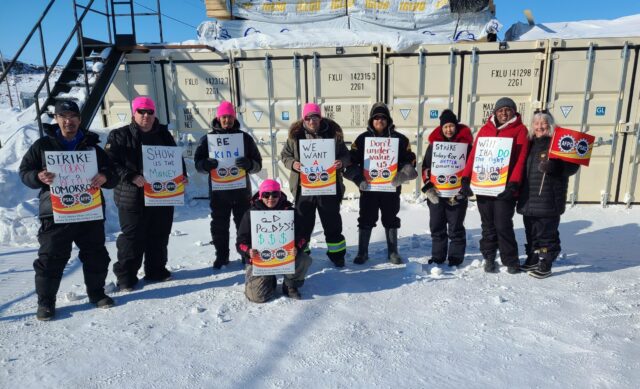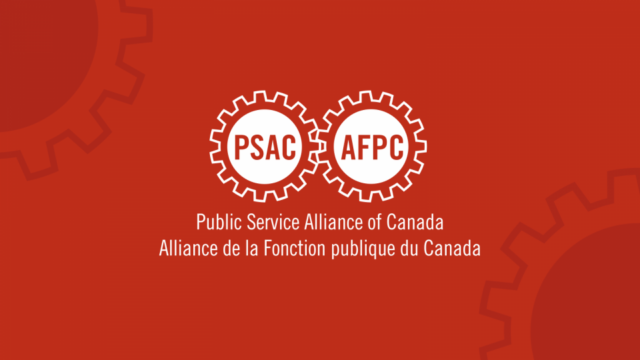Donations to Nunavut Employees Union: Support striking workers | ᐃᑲᔪᕈᒪᔪᑦ ᑮᓇᐅᔭᖅᑎᒍᑦ ᑐᓂᓯᔪᓐᓇᖅᑐᑦ ᓄᓇᕘᒥ ᐃᖅᑲᓇᐃᔭᖅᑏᑦ ᑲᑐᔾᔨᖃᑎᒌᖏᓐᓄᑦ : ᐃᑲᔪᕈᒪᓂᖏᑦ ᐱᓱᑉᐸᑦᑐᓂᑦ ᐃᖅᑲᓇᐃᔭᖅᑎᓂᑦ
PSAC-NEU (Nunavut Employees Union) members working for the Iqaluit Housing Authority (IHA) have been on strike for nearly three months. During that time, the employer’s behaviour has been nothing short of appalling, with IHA locking out workers two days after union members first started walking the picket line on March 17, resorting to using scabs (while denying doing so), and proposing language at the bargaining table that only serves to insult, belittle, and infantilize striking workers. While the lockout itself has since been lifted, the employer’s offer and behaviour remain wholly unacceptable, and the strike continues.
Earlier this week, the CIU National Executive voted to donate $1500 to NEU to support striking workers in their fight against an unfair and unreasonable employer. We encourage all CIU Branches to consider making a donation of any amount. This blatant disregard for both worker and human rights cannot be tolerated. Please see the latest NEU bargaining update or visit https://www.neu.ca/ for more information on this outrageous labour dispute.
ᑭᒃᑯᑐᐃᓇᓐᓄᑦ ᐃᖅᑲᓇᐃᔭᖅᑏᑦ ᑲᑐᔾᔨᖃᑎᒌᖏᓐᓂᑦ ᑲᓇᑕᒥ-ᓄᓇᕘᒥ ᐃᖅᑲᓇᐃᔭᖅᑏᑦ ᑲᑐᔾᔨᖃᑎᒌᖏᑦ ᑭᒡᒐᖅᑐᐃᔨᖏᑦ ᐱᓕᕆᐊᕆᔭᖏᓐᓂᑦ ᐃᑲᓗᓐᓂ ᐃᓪᓗᓕᕆᔨᒃᑯᑦ ᐃᖅᑲᓇᐃᔭᖅᑎᖏᑦ ᐃᖅᑲᓇᐃᔭᖅᑕᐃᓕᓯᒪᓂᖏᑦ ᑕᖅᑭᐅᓗᐊᑦ ᒪᕐᕉᓕᖅᑐᑦ ᐅᖓᑖᓄᑦ. ᑕᕝᕘᓈᖅᑎᓪᓗᑕ ᐃᖅᑲᓇᐃᔭᕝᕕᐅᑉ ᐱᓇᓱᐊᕐᓂᖏᑦ ᓇᕐᕈᓇᖕᒪᕆᒃᐳᑦ, ᐃᓪᓗᓕᕆᔨᒃᑯᓪᓗ ᐃᖅᑲᓇᐃᔭᖅᑎᓂᑦ ᐃᖅᑲᓇᐃᔭᕈᓃᖁᔨᓪᓗᑎᑦ ᐋᔩᖃᑎᒌᑎᓪᓗᒋᑦ ᐅᓪᓗᓄᒃ ᒪᕐᕉᖕᓄᒃ ᐱᓱᓕᑕᐃᓐᓇᑎᓪᓗᒋᑦ ᒫᑦᓯ 17ᖑᑎᓪᓗᒍ, ᐊᓯᖏᓐᓄᓪᓗ ᓵᙵᖔᓕᖅᓱᑎᑦ ᐃᖅᑲᓇᐃᔭᖅᑎᒃᓴᓂᑦ (ᑕᐃᒪᐃᙱᖑᐊᖅᑐᑦ) ᐅᖃᐅᓯᐅᓪᓗ ᒥᔅᓵᓄᑦ ᐋᔩᖃᑎᒌᑦᑎᓪᓗᑕ ᓈᒻᒪᙱᓐᓂᖅᐹᒥᑦ ᓱᕐᓗ ᒥᑭᓪᓕᑎᒃᓯᓇᓱᑐᐃᓐᓇᕋᒥ, ᓱᕈᓯᓛᖅᑎᑐᓪᓗ ᐱᔭᐅᓪᓗᑎᑦ ᓇᒻᒥᓂᖅ ᐃᓱᒪᖃᖏᑦᑐᑎᑐᑦ. ᐃᖅᑲᓇᐃᔭᒍᓐᓃᖁᔭᐅᓂᖏᑦ ᐲᖅᑕᐅᓯᒪᓕᖅᑑᒐᓗᐊᑦ ᑭᓯᐊᓂ, ᐃᖅᑲᓇᐃᔭᕝᕖᑦ ᐱᐅᓯᖓᑦ ᐋᔩᖃᑎᒌᕈᑕᐅᔪᓂᑦ ᓱᓕ ᓈᒻᒪᔅᓯᓯᒪᖏᒻᒪᑦ, ᑕᐃᒪᐃᖕᒪᑦ ᓱᓕ ᓄᖅᑲᖓᕗᑦ ᐱᓱᑉᐸᑦᑐᓪᓗ ᐃᖅᑲᓇᐃᔭᖅᑏᑦ.
ᐱᓇᓱᐊᕈᓯᕆᔭᑦᑕ ᓯᕗᓂᐊᒍᑦ, ᓴᓇᔪᓕᕆᔨᒻᒪᕇᑦ ᓂᐅᕐᕈᑎᒃᓯᔩᓪᓗ ᑭᒡᒐᖅᑐᐃᔨᖏᑦᑕ ᑲᑎᒪᔨᖏᑦ ᓂᕈᐊᓐᓂᓚᐅᖅᑐᑦ ᑐᓂᓯᒍᒪᓪᓗᑎᑦ ᑮᓇᐅᔭᓂᑦ ᐃᑲᔪᕈᒪᓂᒻᒥᓄᑦ $1500ᓂᒃ ᑖᒃᑯᓇᙵᑦ ᑭᒡᒐᖅᑐᐃᔪᓂ ᑐᕌᖓᓂᐊᖅᑐᓄᑦ ᐱᓱᑉᐸᑦᑐᑦ ᐱᓪᓗᒋᑦ ᐊᖓᔪᖄᖃᑲᒻᒪᑦᑐᑎᑦ ᓈᒻᒪᒍᓐᓃᖅᑎᒃᓯᓂᒧᑦ. ᑲᔪᖏᖅᓱᐃᕗᒍᑦ ᓴᓇᔪᓕᕆᔨᒻᒪᕇᑦ ᑭᒡᒐᖅᑐᐃᔨᖏᑦ ᑕᐃᒫᔅᓴᐃᓐᓇᖅ ᐃᑲᔪᖁᓪᓗᒋᑦ ᖃᑦᓯᑐᐃᓐᓇᓯᐊᒻᒥᑦ. ᑕᒪᓐᓇ ᖁᔭᓈᖅᓯᓯᒪᓂᖅ ᐃᖅᑲᓇᐃᔭᖅᑎᖁᑎᒻᒥᓂᑦ ᐊᒻᒪᓗ ᑭᒃᑯᓕᒫᑦ ᐱᔪᓐᓇᐅᑎᖏᑦ ᑕᑯᓪᓗᒋᑦ ᓈᒻᒪᖏᒻᒪᑦ. ᑕᑯᒋᐊᒃᑭᑦ ᒫᓐᓇᐅᔪᖅ ᑭᒡᒐᖅᑐᐃᔩᑦ ᐊᑐᖅᑕᖏᑦ ᐅᕝᕙᓘᓐᓃᑦ ᐃᑭᐊᖅᑭᕕᐊᓄᑦ www.neu.ca ᑐᑭᓯᒋᐊᒃᑲᓐᓂᕈᒪᒍᕕᑦ ᖃᓄᐃᓘᓕᒻᒪᖔᑕ ᐱᓗᐊᖅᑐᒻᒪᕆᐊᓗᒃᑯᑦ ᐋᔩᖃᑎᒌᖕᓂᖏᑦ.










